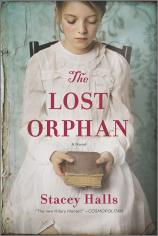The Lost Orphan
Review
The Lost Orphan
What would you do with your newborn if you were a poor, uneducated, unwed mother in 1747 London?
In THE LOST ORPHAN, Bess Bright lives with her father and brother in a tiny two-room apartment, and they struggle to pay the rent and stay warm during the cold London winters. They rise before dawn and, no matter the weather, venture out to sell shrimp in the streets. It's no life for an infant, and Bess doesn't have the ability to stay home to raise a child. But she does have the opportunity to leave her baby at a foundling home. When she is ready, she will be able to reclaim her daughter.
This story is based on the real history of the Foundling Hospital in Bloomsbury. Women went there and drew balls in a kind of cruel lottery that determined whether or not their infants would be taken in. And the process also served as a kind of fundraiser as wealthy members of society would watch the lottery. Perhaps witnessing the desperation on the women’s faces would compel these attendees to donate more for the welfare of the children.
"This is a beautiful book that you won't want to put down, and you will remember and think about it long after you've turned the last page."
When Bess arrives at the home, she does, in fact, get to leave her baby there. But unlike many other mothers who do the same thing, she is determined to reunite with her daughter and raise her. It takes six years, but when Bess returns, shockingly she finds that her child was already taken by someone who claimed to be the little girl’s mother.
THE LOST ORPHAN is told from two perspectives: that of Bess and Alexandra, the wealthy widow who is raising Bess' daughter. However, the novel isn't just about a parent finding her child; it is also about what makes a mother. Author Stacey Halls weaves a story that takes readers on a journey back in time to London --- to the poorest part of the city on the one hand and into well-to-do people's townhomes on the other. In addition, there are important questions to ponder over the course of the tale. Is a child better off in a rich home, never knowing want or hunger, or in a poor but perhaps more caring environment? And if you were a mother, would you remove your child from a safe, wealthy home and bring him or her into a place that might be very loving but doesn’t have the means to provide an education or a childhood free from an odious job?
Admirable and sympathetic, both protagonists are strong women, and their first person narrations draw us into their lives and backstories. Halls has a gorgeous and lyrical writing style. At one point, when Bess comes to understand a friend's fears for her two sons, she says, "I held my daughter, heavy on my chest, and I understood that love and fear were no different. Not really."
The history alone would make THE LOST ORPHAN worth reading, but there's so much more here. This is a beautiful book that you won't want to put down, and you will remember and think about it long after you've turned the last page.
Reviewed by Pamela Kramer on April 10, 2020
The Lost Orphan
- Publication Date: April 7, 2020
- Genres: Fiction, Historical Fiction
- Paperback: 352 pages
- Publisher: Mira
- ISBN-10: 0778309320
- ISBN-13: 9780778309321




